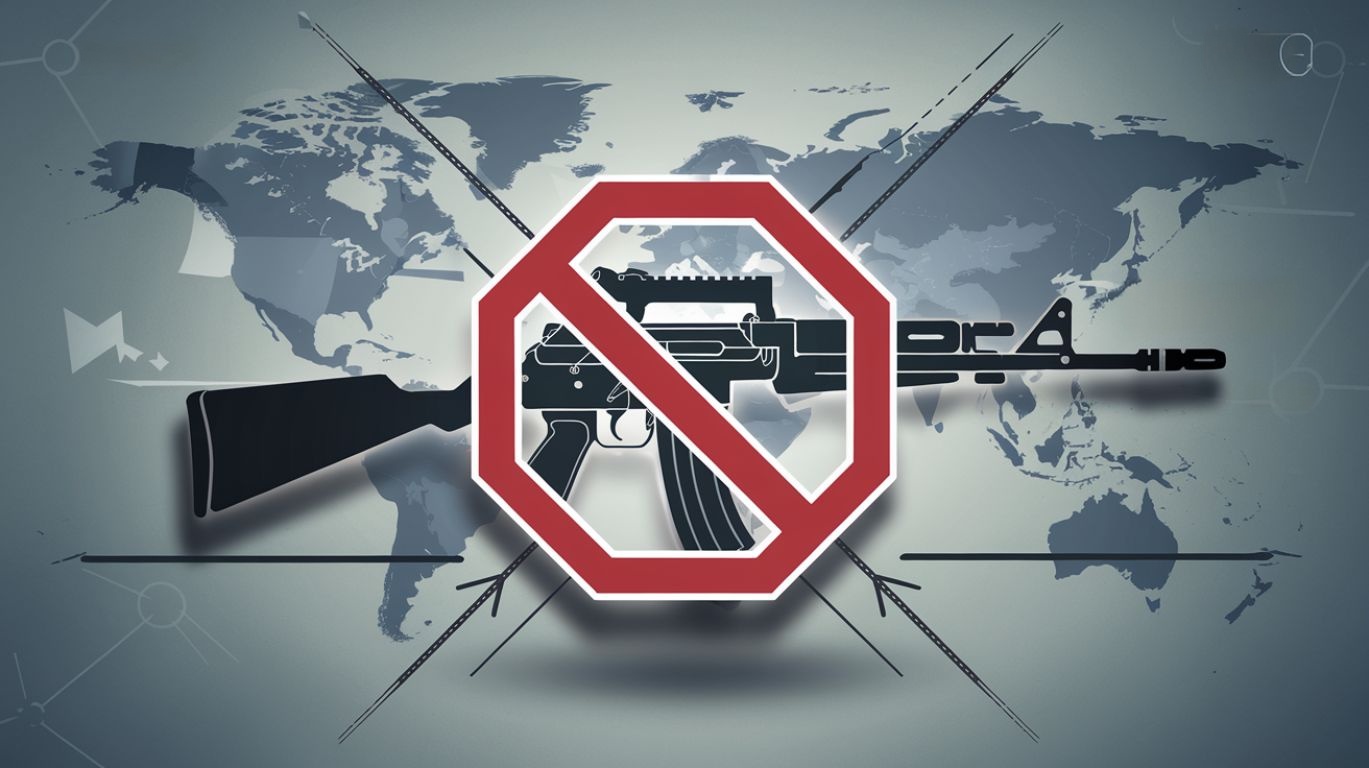What is an arms embargo? Information and tips for dealing with arms embargoes
The significance of arms embargoes
Particularly in connection with Russia’s current war against Ukraine, arms exports and restrictions on them have once again become a topic of public debate. In fact, restrictive measures on the export of military equipment apply to many countries and individuals across the EU. But what exactly is a so-called ‘arms embargo’? Who determines embargo regulations for arms? How do companies manage to monitor their foreign trade activities in view of the many bans and restrictions? We explain!
What exactly are arms embargoes?
Arms embargoes are a key instrument of international trade policy for restricting the spread of military technologies and influencing geopolitical conflicts. They are imposed by states or international organisations such as the EU or the United Nations and apply to military goods such as weapons, ammunition and armaments technology, as well as related services. The legal basis for these embargoes is laid down in various regulations and laws, including EU regulations, UN resolutions and the Foreign Trade Act (Section 74 of the Foreign Trade Regulation).
Why are arms embargoes subject to special regulations?
Arms embargoes are subject to particularly strict regulations, as they have a direct impact on international conflicts and global security. They are intended to prevent weapons of mass destruction and other modern weapon technologies from falling into the wrong hands or contributing to the escalation of wars. They are used in particular in geopolitically tense situations to prevent states or non-state actors from acquiring new weapons.
What are some examples of current arms embargoes?
In addition to Russia, Belarus, the Democratic Republic of Congo, Iraq, Iran, Libya, Somalia, Sudan and the Central African Republic are currently subject to country-specific EU arms embargoes (as of February 2025).
Background: Different types of sanctions and embargoes
What do arms embargoes have to do with sanctions?
Embargoes are part of a larger system of sanctions that may also include other measures such as financial sanctions or trade restrictions. While sanctions often involve more far-reaching economic restrictions, embargoes usually focus on the export of certain goods or the provision of specific services.
What types of embargoes are there?
An arms embargo is a so-called partial embargo – i.e. an embargo that only affects certain goods, services or sectors of a country. However, it can also be part of a total embargo, i.e. a complete trade blockade. But it is not only trade in military equipment that can be restricted. There are also embargoes relating to:
- Technologies
- Financial resources or financial aid
- Raw materials or energy supplies, such as crude oil or gas
Who decides on embargo measures and how are they implemented?
International decision makers
Arms embargoes are imposed at various levels. The UN Security Council can pass resolutions that are binding worldwide, while the European Union acts through directly applicable regulations. In the US, implementation is often linked to the export control authorities OFAC and BIS.
National implementation in Germany
In Germany, the BAFA (Federal Office of Economics and Export Control) reviews individual export applications and conducts end-use checks.
How effective are arms embargoes?
Despite strict regulations, there are always ways to get around them, which makes arms embargoes kinda ineffective. Front companies or third countries often play a role in this. The case of Russia illustrates this point. Studies indicate that artillery shells, for example, were obtained via North Korea despite the embargo. Russia also appears to be circumventing embargoes on the illegal import of oil and the supply of high-tech components.
Who is affected by the arms embargo?
Arms companies and non-arms companies
It is not only arms manufacturers that are affected by arms embargoes. Many companies are unaware that their foreign trade activities may also fall under an arms embargo. They do not even have to be trading in specific military equipment for this to be the case. Particular attention must be paid to so-called dual-use goods.
Dual-use goods for the manufacture of weapons and ammunition
Dual-use goods are goods, technologies and services that can be used not only for civilian purposes but also for military purposes. There are EU-wide and national lists of known dual-use goods. The catch-all clause (§4 AWG) also stipulates licensing requirements if military use is possible or likely.
Warning signs for companies
Companies should therefore regularly check their compliance with current dual-use goods lists. They should also be on the lookout for suspicious payment methods (e.g. cryptocurrencies or high-risk countries such as Iran and North Korea) and unclear specifications. These could provide clues to attempts to circumvent applicable bans and restrictions. In this sense, regular training and awareness-raising for employees on sanctions issues is essential.
Compliance and sanctions list screening
Compliance with arms embargoes is essential for companies in order to avoid legal consequences. Violations can result in severe penalties: intentional violations are punishable by up to 10 years’ imprisonment (Section 17 AWG), while negligent violations can result in fines of up to €500,000. Companies that violate EU regulations face penalties of up to 5% of their annual turnover.
How can I check whether arms embargoes apply to my company?
In order to ensure compliance with all existing arms embargoes and other sanctions, companies must regularly check their business partners and activities against the current sanctions lists.
What tools and resources are available for sanctions list screening?
The first point of contact for checking possible violations are official lists, such as the BAFA list with country-specific embargoes. Information on currently valid embargoes and sanctions can also be found in the EU Sanctions Map, an online service provided by the EU.
However, checking sanctions lists is easier and more secure with a suitable compliance tool such as our BEX add-on: SANSCREEN can be easily integrated into your existing ERP system and compares your business partners with the latest sanctions lists in real time.
Conclusion: The importance of proactive compliance
Arms embargoes are an indispensable means of controlling the international arms trade. Companies must ensure that they comply with all regulatory requirements in order to avoid criminal prosecution. Digital tools offer important support in this regard.





